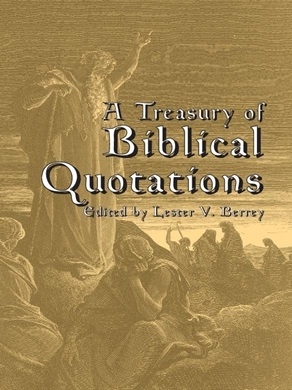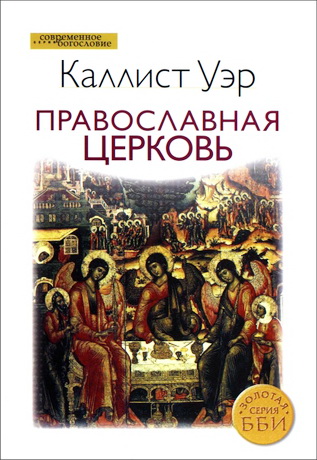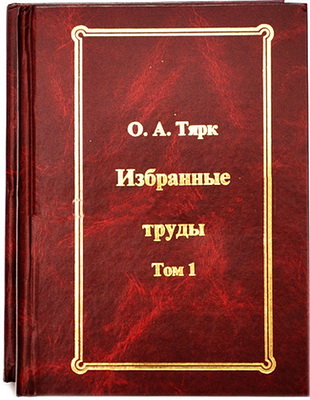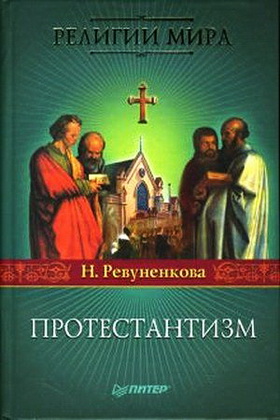
Berrey - Treasury of Biblical Quotations - модуль BibleQuote
Lester V. Berrey - Treasury of Biblical Quotations
Originally published: Garden City, N.Y. : Doubleday, 1948.
A TREASURY OF BIBLICAL QUOTATIONS is a thesaurus of the significant pointed passages of Scripture topically classified and so organized for ready reference that students, ministers, teachers, writers, speakers, and all who seek the desired verse, the pertinent passage, the comforting or instructive Scripture on any subject may find it quickly and easily. It is designed for the layman for the pleasures and rewards of stimulating and inspirational reading, and especially for its great usefulness as a tool for the Bible student, as a constantly employed direct reference work. It is a book which will, it is planned, facilitate the inquirer’s approach to the Bible by affording ready access to its treasures and heighten his appreciation of it by an analysis of its significance.
Its preparation was inspired by the obvious deficiencies of such pioneer classifications of Scripture as have hitherto been available and have consequently passed into general disuse. With but slight modifications, they followed Matthew Talbot’s inadequate method of presentation of over a century ago, in which selected passages of length were grouped, as they could, under general headings. They were consequently a partial and an indiscriminate analysis of matter without regard to particular application, rather than a thorough classification of pertinent verses. Nor has the opposite extreme been considered a virtue, in which the number of groupings has been extended to include numerous synonymous or nearly identical subjects, with a representative selection of passages under each, so that, in the end, one must turn to them all to find a full display, only to discover a promiscuous duplication of content insufficiently recorded. Neither should worth be measured by magnitude, in a classification of everything found in the Scriptures, which, while of value to the student in quest of extended passages, sacrifices pertinence of application, in search of which the reader must wade through a mass of irrelevant matter.
The present work is intended to supply the modern need for a topical presentation of Scripture, constructed on the same plan as popular collections of literary quotations, embracing the widest possible range of practical subjects and providing a comprehensive display of significant passages, with space-devouring overclassification and overlapping avoided by an extensive utilization of cross references. The object was not to develop religious subjects only, but to furnish all those which may be of service to every requirement and to all those who desire to consult the Bible.
The result is a thoroughly up-to-date reference work for modern needs and modern demands.
In constructing the following system of classification, the chief aim has been the basic one of obtaining the greatest amount of practical utility. The plan is simple. Subjects are arranged in alphabetical order, and, under each subject, the verses appear in their Biblical sequence. Wide scope is given to each classification, and duplication has been avoided, by an elaborate system of cross references to kindred and antithetical groups of categories. These follow immediately after the heading and are listed in their order of approximation in significance to the subject or cross-reference heading, rather than alphabetically. A complete listing of subjects and cross references is provided in the Subject Index at the back of the book, as well as in the text.
The categories have evolved out of the natural connotations of the verses, not arbitrarily imposed according to a preconceived plan. Thus will one find the essential topics represented, and the basic-synonym cross references to them. The dimensions of the sections are in proportion to the Biblical emphasis and to the relative importance and utility of subjects.
Theological bias has been avoided. The texts have not been selected and classified to sustain any sectarian acceptance. Passages variously interpreted are so cited, without reference to the personal views of the compiler.
The King James version has been quoted throughout.
* * *
IMPERFECTION
see also WANT
There is no man which sinneth not.
—2 CHRON. 6:36
Behold, I was shapen in iniquity; and in sin did my mother conceive me.
—PSA. 51:5
If I justify myself, mine own mouth shall condemn me: if I say, I am perfect, it shall also prove me perverse.
—JOB 9:20
There is none that doeth good, no, not one.
—PSA. 14:3
If thou, Lord, shouldest mark iniquities, O Lord, who shall stand?
—PSA. 130:3
Who can say, I have made my heart clean, I am pure from my sin?
—PROV. 20:9
There is not a just man upon earth, that doeth good, and sinneth not.
—ECCL. 7:20
All we like sheep have gone astray; we have turned every one to his own way.
—ISA. 53:6
All our righteousnesses are as filthy rags.
—ISA. 64:6
The heart is deceitful above all things, and desperately wicked: who can know it?
—JER. 17:9
Why beholdest thou the mote that is in thy brother’s eye, but considerest not the beam that is in thine own eye?
—MATT. 7:3
He that is without sin among you, let him first cast a stone.
—JOHN 8:7
Thou art inexcusable, O man, whosoever thou art that judgest: for wherein thou judgest another, thou condemnest thyself; for thou that judgest doest the same things.
—ROM. 2:1
There is none righteous, no, not one.
—ROM. 3:10
All have sinned, and come short of the glory of God.
—ROM. 3:23
Wherefore, as by one man sin entered into the world, and death by sin; and so death passed unto all men, for that all have sinned.
—ROM. 5:12
The scripture hath concluded all under sin.





Комментарии
Пока нет комментариев. Будьте первым!